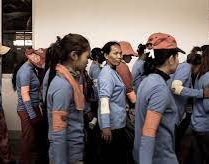Cambodia’s garment, footwear and travel goods industry has kicked off negotiations over a new monthly minimum pay for 2023, though talks remain in the early stages, the Southeast Asian nation’s wage board revealed Monday. [Cambodia Starts New Minimum-Wage Talks – SJ]
While the first meeting heard the concerns of various stakeholders, from the rising cost of living to the need to maintain national competitiveness, “employers’ representatives and the workers’ representatives were, however, unable to confirm some figures, and will do so at another meeting,” it said in a statement. Follow-up meetings will be held later this month and in September, the council added.
Cambodian garment workers currently receive a monthly floor of $194, or $2 more than they received in 2021. The final number, even with an additional $7 housing and transportation allowance, was a disappointment to the labor groups representing the sector’s 800,000 mostly female employees, who together help generate more than one-third of the country’s gross domestic product.
Unions had asked for a $12 bump: Covid-induced lockdowns in manufacturing hubs such as Phnom Penh had ravaged the incomes of tens of thousands of already savings-starved workers, leaving them struggling to survive. Many found themselves caught in a cycle of debt and increasing desperation.
As it stands, the Cambodian industry’s minimum wage is roughly 47 percent of what constitutes a living wage, estimates The Industry We Want, a multistakeholder initiative founded by the Ethical Trading Initiative and the Fair Wear Foundation.
“We reported to the Ministry of Labor and the National Minimum Wage Council on the daily expenses of the factory workers, the expenses for the workers’ daily food purchases, and the savings to be sent home,” Ath Thorn, president of the Cambodian Labour Confederation, told the Khmer Times. “In it, we told them about the living problems of workers in rented rooms, having to pay for water and electricity. However, the unions did not talk about the increase we are seeking for 2023.”
Because of runaway inflation, garment workers will need an extra $20 to $50 to get by, Thorn said.
Free Trade Union president Toch Ser said she was cognizant of factory owners’ own narrowing margins. During last year’s wage talks, suppliers complained that any increase would strain their bottom lines because their operating costs were also on the rise.
“We want workers’ salary to be increased because it will help solve the problems of workers’ daily lives appropriately,” Ser said told the Khmer Times. “We are, of course, considerate of employers’ problems and issues especially those that have come about following the Covid-19 pandemic and lockdowns, and that is why we are only asking for a small increase.”
In a statement on its website this week, the Garment Manufacturers Association in Cambodia alluded to potential roadblocks. “With the Royal Government of Cambodia’s high ability to manage Covid-19, Cambodia can maintain production stability, sustain economic growth and export,” the trade group said. ”However, there is a decline in profitability in the sector and the future situation remains uncertain and unfavorable for Cambodia’s export for at least more than one year.”
The garment, footwear and travel goods industry exported $6.6 million of goods during the first half of the year, a 40-percent year-over-over increase, according to a report from Cambodia’s department of customs and excise.
Prime Minister Hun Sen has insisted that garment workers need to be paid, and that he’s willing to borrow from the national budget to do so. He told a graduation ceremony in Phnom Penh on Thursday that he has instructed the minister of labor to resolve a wage theft issue affecting some 400 workers at Canteran Apparel factory. The supplier, he said, hadn’t paid its employees since May, sparking protracted demonstrations in the Por Senchey district.
“I am very happy to see the prime minister’s order and hope the factory owner will now speed up the procedures to distribute the pending wages,” San Sopha, a workers’ representative, told the Khmer Times. “The workers have waited for more than three months to resolve their salary issues with the Canteran Apparel factory.”
Hun Sen also said that Cambodia will not abandon workers or unions, and that their demands need to be met in accordance with the nation’s laws.
His proclamation came on the heels of a new pension scheme for private sector workers, including garment employees, that will go into effect in October. The fund will ladder up: For the first five years, workers and employers will be required to each contribute 2 percent of the workers’ wages. This will then increase to 4 percent apiece, with an extra 2.75 percent for every subsequent decade. Workers will be able to tap into the fund when they turn 60.
“The pension scheme is an additional benefit and opportunity for workers in a private company,” said Athit Kong, president of the Coalition of Cambodian Apparel Workers Democratic Union. “And the majority of workers welcome it but they need more awareness raising.”
Christina Hajagos-Clausen, director of the textile and garment industry at IndustriALL Global Union also praised the program.
“Social protection is a human right and designed to reduce and prevent poverty and vulnerability throughout the life cycle,” she said. “Cambodia’s new pension scheme is a positive step forward in strengthening social protection for garment workers.”


